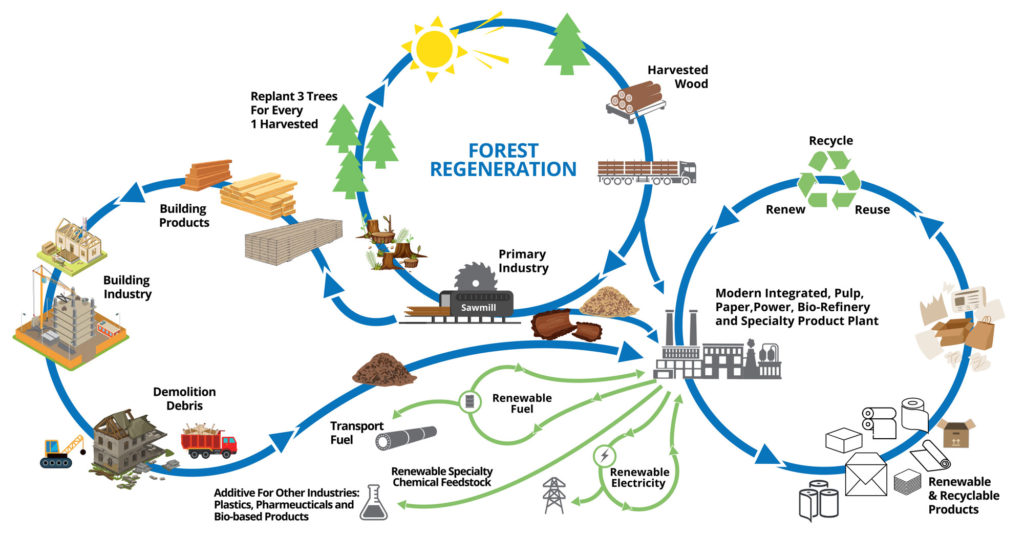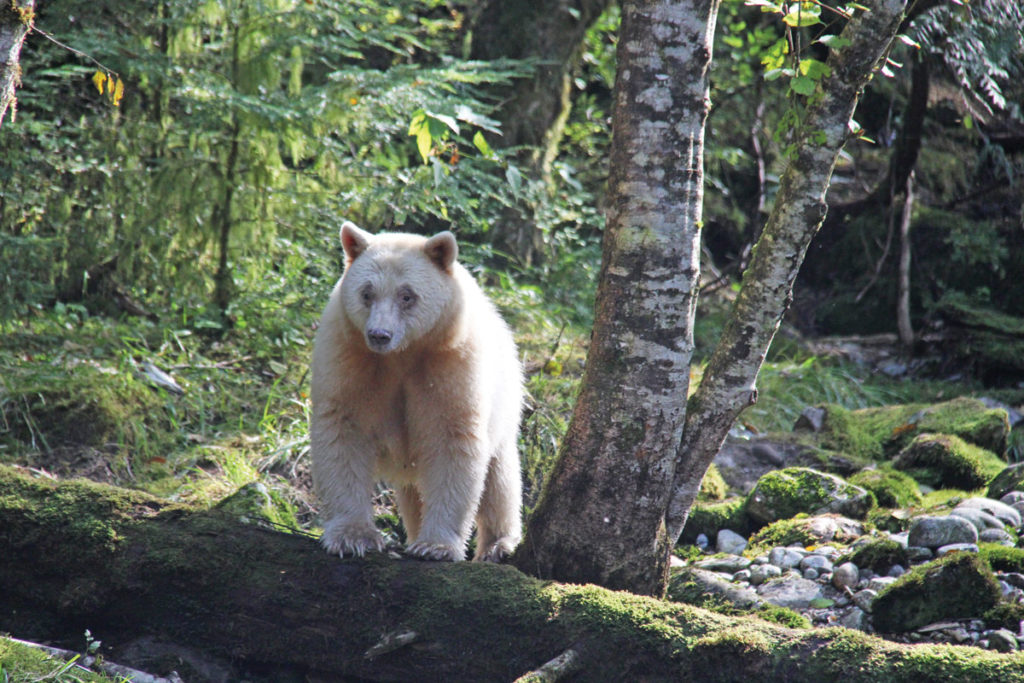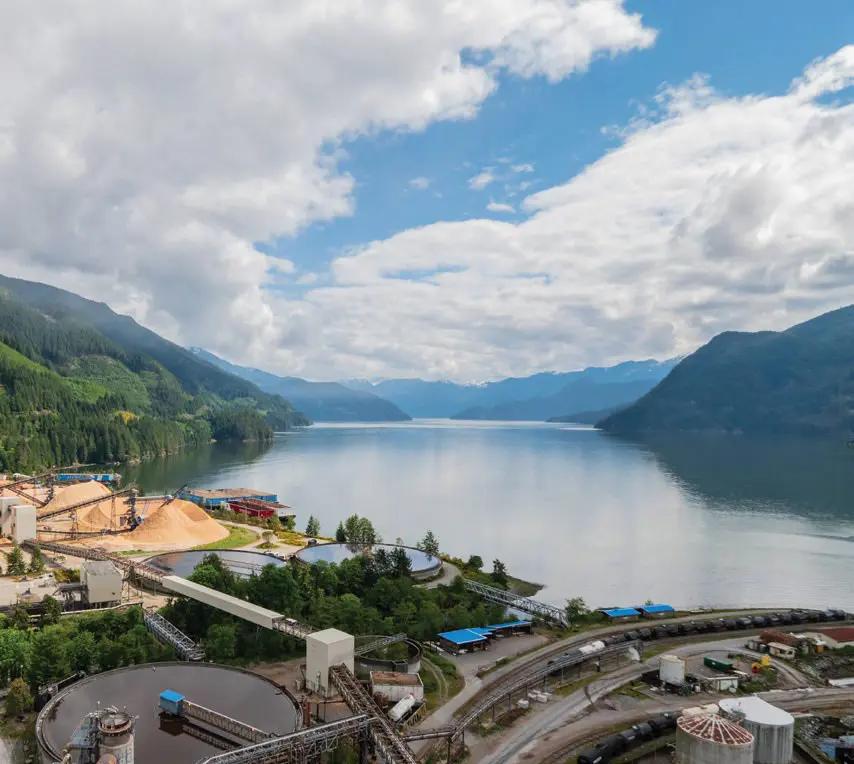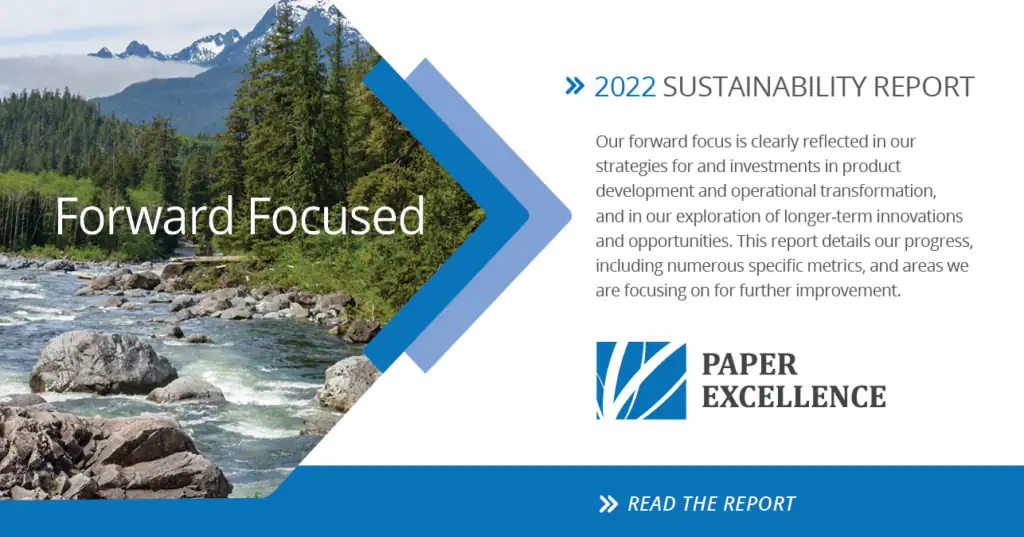
SUPPORTING SUSTAINABLE PULP AND PAPER PRODUCTION
At Paper Excellence, we believe we can accomplish greater things by working cooperatively, transparently and safely with others. This includes teaming up with employees and external groups that share some of our interests.

PAPER EXCELLENCE CARES ABOUT CERTIFICATION
We maintain chain of custody certification with multiple, globally recognized voluntary certification schemes. These chain of custody
certifications enable us to track fibre from its point of origin through to delivery to a customer. Assuming that a customer has its own
validated chain-of-custody system, it can carry the certification assurance right through to end use (including on-product labels).

*SFI marks are registered marks owned by the Sustainable Forestry Initiative Inc.
FORWARD FOCUSED
We are one of Canada’s foremost forest businesses utilizing large scale, technically advanced manufacturing at its core. We are part of global and North American supply chains that depend on Canada’s well-managed forests which allow us to deliver a growing range of products to our customers. Forward Focused: 2022 Sustainability Report looks at both our achievements and our opportunities to do better within this framework.
Learn MoreSUSTAINABLE FOREST BASED PRODUCTS


OUR ENVIRONMENTAL POLICY
We are committed to conducting business in a manner that protects the environment, conserves resources, reduces its environmental footprint and ensures sustainable development.
SUSTAINABLE PARTNERSHIPS
We partner with organizations like Corporate Knights and Greenblue to enhance our commitment to sustainability — and to the natural world surrounding us. We also work hard to promote and improve the safe working conditions of our employees. Our relationships with local communities not only include ecological discussions but concerns around property taxation levels.
Catalyst has been a longtime supporter of GreenBlue, a nonprofit that equips business with the science and resources to make products more sustainable. GreenBlue’s Forest Products program includes the Forest Products Working Group, the Environmental Paper Assessment Tool and the Paper Life Cycle.
Since 1998, four of Paper Excellence’s coastal BC mills have been Great Bear Rainforest partners, working with other forest companies and Greenpeace, STAND (formerly ForestEthics), and Sierra Club of Canada. Over the past decade, 8,200 square miles of valuable forest lands have been permanently protected on BC’s central coast. At the same time, the initiative has developed a new approach to forest management and successfully implemented FSC forest management certification in the region. We’re proud of the Great Bear Rainforest and what the Ecosystem Based Management approach achieved in balancing its environmental integrity and social well-being.


PROTECTING THE GREAT BEAR RAINFOREST
Following controversial forest campaigns in the mid 1990s, four of Paper Excellence’s coastal BC mills have been working to protect the Great Bear Rainforest through parks and protected areas and the new forest practice called Ecosystem Based Management (EBM). This work aims to bring the Great Bear Rainforest into low ecological risk while balancing well-being of local communities created by forestry employment.
Environmental Effects Monitoring (EEM)
Paper Excellence and Catalyst mills participate in the federal government’s Environmental Effects Monitoring (EEM) program, which focuses on the impacts of mill emissions to water. It involves a rolling cycle of study design, field testing, and reporting, providing important insights on the health of aquatic ecosystems and the effectiveness of regulatory protection.
Studies include precise assessments of how mill discharges affect the life cycles of fish and other marine species at all locations, and additional site-specific surveys and testing as local circumstances require. Community input has helped inform the content and scope of EEM studies.
Findings over five EEM cycles have shown improved marine conditions – such as a downward trend in dioxin and furan concentrations – which can often be linked to specific operational changes.

MILL EEM CYCLE DOCUMENTS
| Attachment | Size |
|---|---|
| Crofton EEM Cycle 9 | 13.28 mb |
| Crofton EEM Cylce 7 | 4.67 mb |
| Crofton EEM Cycle 6 | 8.62 mb |
| Crofton EEM Cycle 5 | 8.85 mb |
| EEM Program – Recent Amendments, Presentation to Crofton Local Monitoring Committee 2009 | 12.98 kb |
| Attachment | Size |
|---|---|
| Port Alberni EEM Cycle 8 | 6.51 mb |
| Port Alberni EEM Cylce 7 | 9.04 mb |
| Port Alberni EEM Cycle 6 | 4.84 mb |
| Port Alberni EEM Cycle 5 | 4.72 mb |
| EEM Program – Recent Amendments, Presentation to Crofton Local Monitoring Committee 2009 | 12.98 kb |
| Attachment | Size |
|---|---|
| tiskwat EEM Cycle 7 | 7.57 mb |
| tiskwat EEM Cycle 6 | 3.26 mb |
| tiskwat EEM Cycle 5 | 95.84 kb |
| EEM Program – Recent Amendments, Presentation to Crofton Local Monitoring Committee 2009 | 12.98 kb |
| Attachment | Size |
|---|---|
| Skookumchuck Cycle 9 | 1.79 mb |
| Skookumchuck Cycle 8 | 1.44 mb |
| Skookumchuck Cycle 7 | 5.71 mb |
| Skookumchuck Cycle 6 | 3.45 mb |
| Skookumchuck Cycle 5 | 53.81 kb |
| Skookumchuck Cycle 4 | 4.61 mb |
| Skookumchuck Cycle 3 | 10.9 mb |
| Skookumchuck Cycle 2 | 85.81 kb |
| EEM Program – Recent Amendments, Presentation to Crofton Local Monitoring Committee 2009 | 12.98 kb |
| Attachment | Size |
|---|---|
| Howe Sound EEM Cycle 9 Interpretive Report | 28.94 mb |
| Howe Sound EEM Cycle 8 Final Report | 4.02 mb |
| Howe Sound EEM Cycle 7 Final Report | 2.43 mb |
| Howe Sound EEM Cycle 6 Final ReportReport | 11.84 mb |
| Howe Sound EEM Cycle 5 Final Report | 12.81 mb |
| EEM Program – Recent Amendments, Presentation to Crofton Local Monitoring Committee 2009 | 12.98 kb |

